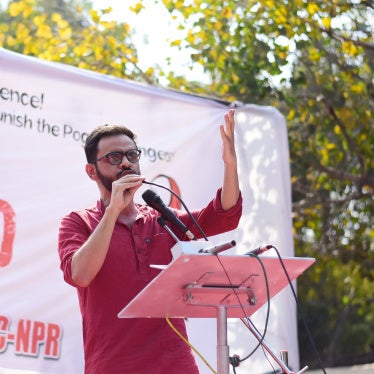(New York) - The release of the Chinese artist and activist Ai Weiwei on June 22 is a relief for his family, friends and supporters, but leaves troubling unanswered questions about his arrest, detention and conditions of release, Human Rights Watch said today. In particular, Human Rights Watch is concerned about the political nature of his arrest, the conditions under which the police may have extracted a "confession" from him, and possible restrictions on freedoms he faces following his release.
Ai's release on bail was followed by a statement from Xinhua, the official government news agency, saying he had been released because of his "good attitude in confessing his crimes" and because he suffers from an unspecified chronic disease. The statement added that Ai's release resulted from consideration of the fact that he had repeatedly said he is willing to pay the taxes that the government alleges that he has evaded.
"The Chinese government's decision to arrest Ai Weiwei was political, and so is his release," said Sophie Richardson, Asia advocacy director at Human Rights Watch. "But it is also an example of how international pressure works, since Beijing was paying a high cost to its reputation for his detention."
Ai Weiwei, 54, is one of China's most prominent artists and an outspoken government critic. He was forcibly disappeared on April 3 at Beijing Capital Airport and his detention was acknowledged only on April 7. He remained in police custody under "residential surveillance" at an unknown location for 80 days. He was denied access to his lawyer, and his wife was allowed to visit him only once on May 15, 42 days into his detention.
Ai, who has in the hours following his release exchanged text messages with a number of activists and journalists, will probably return to his legal place of residence in the Beijing suburbs. It is likely that he will face restrictions on his movements and will be required to report to the police regularly, Human Rights Watch said.
In the past six months, the Chinese government has disappeared and/or arbitrarily detained dozens of activists, writers, lawyers, and others. Upon their release, several have retreated into uncharacteristic silence and seclusion, leading to concerns that they have been threatened with further abuses if they speak out. At least 10 others who are less well-known than Ai have been victims of enforced disappearances since mid-February. They remain incommunicado, their whereabouts unknown, and thus are at high risk of torture in custody.
"International pressure apparently prodded the Chinese government to conclude that the cost/benefit ratio of continuing to detain Ai Weiwei wasn't worth it," Richardson said. "The international community should maintain that same pressure for the release of the many other innocent victims of the Chinese government's current wave of repression."








